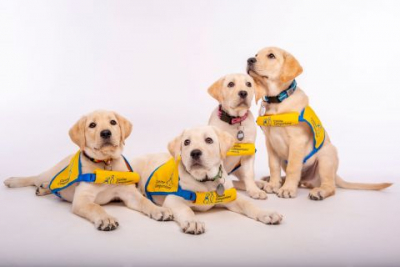Duke Today

September is National Service Dog Month, and the four new members of the 2022 Duke Puppy Kindergarten have been around the Triangle promoting the value of service dogs.
The puppies are part of a National Institute of Health-funded project that tests the cognitive development of puppies from eight weeks old to 20 weeks old, during their last, rapid stage of puppy brain development. The goal of the project is to understand what experiences puppies need early in life to be successful service animals.
This week, the puppies traveled to Raleigh to meet with city Mayor Mary-Anne Baldwin to highlight the role service dogs play in assisting humans in need.
The kindergarten is a partnership between Duke researchers and the national non-profit Canine Companions, which created the concept of service dogs nearly 50 years ago.
Over the years, the Puppy Kindergarten has tested the cognitive performance of more than 70 Canine Companions puppies.
“The goal of the Duke Puppy Kindergarten is to increase the supply of service dogs and to see more dogs graduate and serve more people,” says Vanessa Woods, director of the Duke Puppy Kindergarten.
“We are so happy to welcome the Fall Class of 2022 to Duke,” says Woods. “But if we had more people, at Duke as well in the local community, to be volunteer puppy raisers, we could have more puppies off campus that could be part of our research.”
The goal of the research is to understand what experiences puppies need early in life to be successful service animals. A puppy’s brain is mostly developed by 20 weeks. By measuring how puppies perform in cognitive tests, researchers can determine which skills are important to service dog success.
“A service dog is specially trained to perform tasks to help a person with a disability to live with greater independence,” says Dr. Brenda Kennedy, Canine Companions national director of canine health and research. “We are honored to work with the Duke Puppy Kindergarten. The information we learn from collaborations like this allow us to focus on making adjustments in our program that will help more puppies achieve their fullest potential, which translates to serving more people with disabilities.”